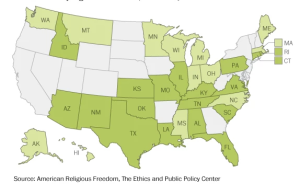 The Religious Freedom Restoration Act (RFRA) is not Christian versus Gay. I have said before that regardless of anyone’s feelings the morality of gay marriage, I feel that it would be unconstitutional to deny the LGBT population that right. However, matters of conscience can be tricky things and should not be ignored. For my own (and hopefully your) edification, I would like to give a brief history of the law and discuss Christian reactions to it that have come across my Facebook feed.
The Religious Freedom Restoration Act (RFRA) is not Christian versus Gay. I have said before that regardless of anyone’s feelings the morality of gay marriage, I feel that it would be unconstitutional to deny the LGBT population that right. However, matters of conscience can be tricky things and should not be ignored. For my own (and hopefully your) edification, I would like to give a brief history of the law and discuss Christian reactions to it that have come across my Facebook feed.
The original RFRA was passed in 1993 by Congress, unanimously in the house and 97-3 in the Senate. It states, “Government shall not substantially burden a person’s exercise of religion even if the burden results from a rule of general applicability.” So even if a law was not intentionally a burden to the free practice of religion, it could still be a burden and thus would be illegal. The exception to the rule would be if it were unavoidable for the furthering of a compelling government interest. Compelling government interests are things that refer to public good, law and order, and constitutionality. A friend of mine explained it to me like this.
The upshot is that if the government unduly interferes in the religious practice of a person (the law above was passed in response to the Employment Division v Smith, in which a couple of Native American men were denied employment based on their use of peyote in long-standing religious rituals) that person or those persons have the right to sue for damages. It makes an exception for government “interests” or activities that we expect the government to enforce or uphold, regardless of religious beliefs.
There was an instance in which a Muslim man in prison wasn’t permitted to wear a beard, although his religion required him to have a beard at least half an inch long. There were exceptions for medical reasons but not for religious reasons. In that instance, because it didn’t interfere with the compelling interest of the government, which was to keep him in prison for the duration of his sentence, it was considered a violation of RFRA. If he had argued that he should be released so that he could make a pilgrimage to Mecca, that would have been ignored as it went counter to the government’s compelling interest to keep him incarcerated for the duration of his sentence.
This applied only to violations by the Federal government. Thirty-one states now have RFRA protections either by legislation or by state court decisions. From the Washing Post blog of April 1:
“These state RFRAs were enacted in response to Supreme Court decisions that had nothing to do with gay rights or same-sex marriage,” explained University of Virginia law professor Douglas Laycock in an e-mail. “And the state court decisions interpreting their state constitutions arose in all sorts of contexts, mostly far removed from gay rights or same-sex marriage. There were cases about Amish buggies, hunting moose for native Alaskan funeral rituals, an attempt to take a church building by eminent domain, landmark laws that prohibited churches from modifying their buildings – all sorts of diverse conflicts between religious practice and pervasive regulation.”
Why is there such an uproar about Indiana? Indiana, unlike most other states, allowed any for-profit business to assert a right to “the free exercise of religion,” and any individual could assert a violation whether or not any government entity was a party to the proceeding. This was seen as a license to refuse service to members of the LGBT. community. There has been such a backlash against Indiana and their law that they hastily passed an amendment. In Mike Pence’s own words on April 2:
Hoosiers deserve to know, that even with this legislation, the Religious Freedom Restoration Act enhances protections for every church, non-profit religious organization or society, religious school, rabbi, priest, preacher, minister or pastor in the review of government action where their religious liberty is infringed. The law also enhances protection in religious liberty cases for groups of individuals and businesses in conscience decisions that do not involve provision of goods and services, employment and housing.
Crisis in Conscience
Comments on a Facebook Christian page showed that these Christians had no problem with serving gay customers in a store or selling them a birthday cake. But they feel that coercing them to make a wedding cake for a gay couple, however, is forcing them to participate in an event which they believe to be wrong. Serving gays in general is not the problem but the specific event. One person said,
I have asked a gay friend, “What if gay bakers were asked to make cupcakes for an anti-gay marriage rally? Should they be compelled to serve that event?” When the shoe is on the other foot it makes sense to them (sometimes). My friend replied that the gay bakers should in fact “comply,” but it I think it gave him some good perspective. They would obviously be serving an event they disagree with, and I wouldn’t want them to be compelled to do such a thing. Honestly, i can’t even believe we have to ask these questions; it seems so obvious to me that one should not have to burden one’s conscience that way, especially when there are alternative providers willing to serve such an event.
Randall Smith wrote a good post commenting that there is a difference between having to tolerate things with which you disagree; it is another entirely to force someone to participate in those things. This can create a crisis in conscience.
Another person pointed out a potential hypocrisy wondering how many Christian businesses refuse to serve bachelor parties or baby showers for unwed cohabitants. On another page, a Christian commenter took this one step further and said that because no one refused to serve these events, to refuse to serve a gay wedding was blatant and purposeful discrimination. Some expressed reservations about giving special powers of refusal to certain jobs or vocations: pastor vs wedding planner. Some took the capitalistic approach.
I’m of the opinion that businesses have the right to refuse service to anyone they please for any reason they like.
“Are those the new Jordans?”
“Yep”
“No soup for you!”
Can’t believe is even a debate.
If you think the business owner’s a bigot… don’t hire them.
I would like everyone to understand that while there are undoubtedly some Christians who are bigots and discriminatory, that is not the norm. Many of the comments talked about how to go about acting in love without compromising the conscience. We have differences of opinion but can discuss them with civility. People have different experiences and histories that affect their consciences and how they think about political and cultural issues. Our country should maintain the right of every citizen to act or not act, on matters of conscience. RFRA isn’t just for Christians.
I had copied the legal summary of the RFRA law onto my FB status and asked, “What does this mean exactly?” I got the following comment.
This law allows idiot, ill-informed, bigoted Religion and Faith Needers to exercise their right to be just that without any hope of litigation and or restitution. It allows discriminatory practices, legal snow-blowing as well as Character Assassination if it fits within the religious framework of the defendant. It’s a right to be insane without any actual consequences. It’s the first step in a violation of Church and State Separation, and I told you it was coming. It’s like Med-Fair, only the idiots here who dress up are supposed to be taken seriously when it comes to your rights as an American Citizen and not a citizen of a Theocracy. It’s Nazi and It’s Christian in its inception. Welcome to the world that Faith (STUPIDITY) can provide.
“Religious” people do not have a monopoly on hate and vitriol.
Like this:
Like Loading...




